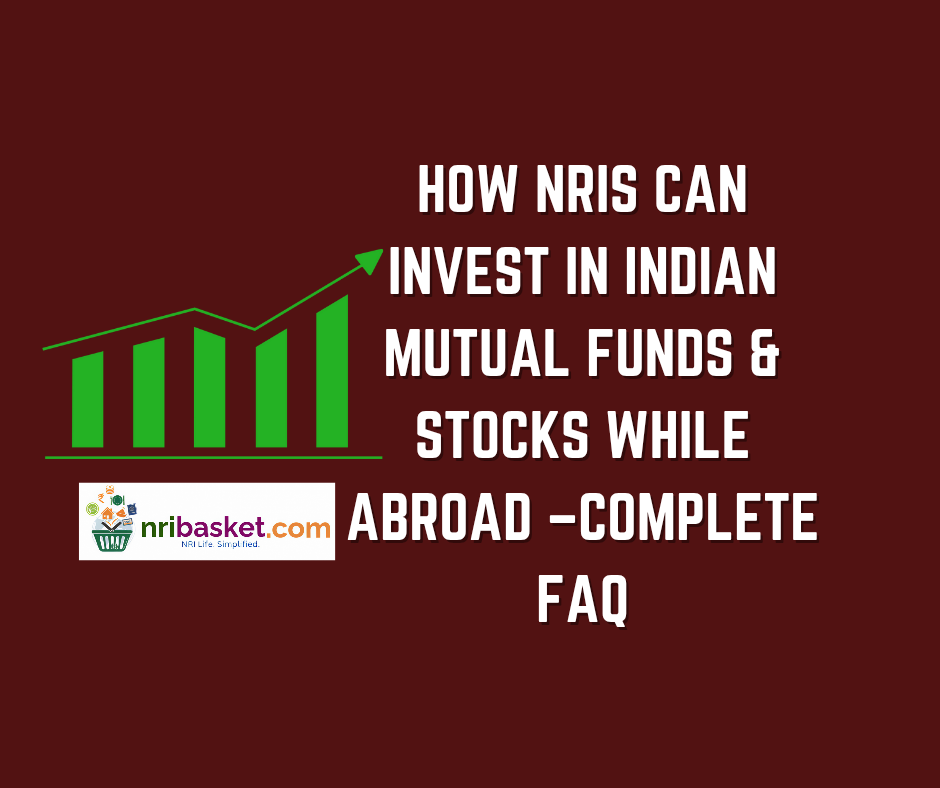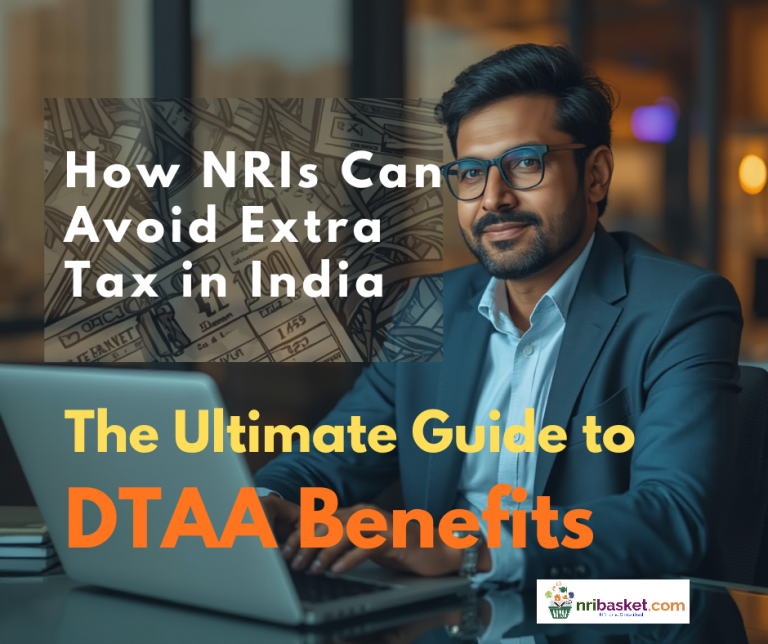
Mutual funds investment in india FAQs complete guide
How NRIs Can Invest in Indian Mutual Funds & Stocks While Abroad – Complete FAQ
Complete guide for NRIs on investing in Indian mutual funds and stocks from abroad. Step-by-step process, accounts to use (NRE/NRO), PIS, KYC, taxation, repatriation, platform options and advanced tips.
NRIs commonly invest in Indian equities and mutual funds to benefit from India’s long-term growth. This guide explains —step-by-step how NRIs can invest in stocks and mutual funds from abroad, what bank/accounts to use, required KYC, the Portfolio Investment Scheme (PIS), tax & repatriation rules, and practical tips to avoid common pitfalls.
Quick step summary to invest in mutual funds in India while abroad.
- Open NRE/NRO bank account (or use existing NRE/NRO).
- Complete NRI KYC and FATCA forms with a registrar/AMC/broker.
- Open a Demat + trading account (PIS route required for equities).
- Invest in mutual funds via NRE/NRO (SIP or lump-sum) or use a broker/AMC portal.
- Track tax, TDS and repatriation rules; file Indian ITR if required.
30 FAQs How NRIs Can Invest in Indian Mutual Funds & Stocks
Long Answer: NRIs are permitted to invest in Indian mutual funds through NRE/NRO/FCNR accounts and in listed equity via the Portfolio Investment Scheme (PIS) routed through designated banks and an NRI-compliant trading & demat account. Different rules apply to agricultural/plantation land and certain security types.
Long Answer: NRE (Non-Resident External) accounts hold foreign currency repatriated into India and are fully repatriable along with returns; NRO accounts hold income earned in India (rent, dividends) and are subject to repatriation limits and tax compliance. Many NRIs use NRE for repatriable investments and NRO for income received in India.
Long Answer:NRIs can invest in mutual funds using NRE or NRO accounts. Investments via NRE are repatriable (principal and gains),while NRO-based investments may have repatriation restrictions and require additional documentation.
Long Answer: AMCs, brokers and registrars require NRI-specific KYC — proof of overseas address, passport, overseas visa/residence permit, PAN, and FATCA declaration. Some steps can be completed online; others may need physical copies or attestation via the bank or Indian consulate.
Long Answer: To trade listed equity, NRIs normally open an NRI demat account and an NRI trading account with an Indian broker. Equity purchases for NRIs are executed under the RBI’s Portfolio Investment Scheme (PIS) through a designated AD bank that routes funds between your NRE/NRO and exchange. PIS compliance (single designated bank, pre-funding rules, and limits) is mandatory.
Long Answer: PIS is an RBI-regulated route which requires NRIs to have a PIS-enabled NRE/NRO account with a designated AD bank. The bank monitors transactions, ensures limits (like 5% cap per company) and routes payments for equity trades executed on recognised exchanges.
Long Answer: NRIs must open NRI-specific demat and trading accounts; regular resident retail broking accounts cannot be used. Many large brokers have NRI desks that support PIS routing, remittance paperwork and repatriation documentation.
Long Answer: Most mutual funds allow NRIs to start SIPs from NRE/NRO accounts after completing NRI KYC. Investors should confirm SIP debit mandates (NRE vs NRO) and repatriation treatment with the AMC.
Long Answer: NRIs may apply in IPOs subject to RBI/SEBI rules; some portions can be reserved for non-resident investors. IPO investment requires correct demat instructions, PIS routing and AMC/broker guidance for allotment handling.
Long Answer: Dividends from Indian companies / mutual funds paid to NRIs are subject to Indian taxation and withholding. Recent tax regime changes mean dividends are taxed in the investor’s hands and the payer may withhold tax at source. NRIs should check current TDS rates and claim treaty benefits (if applicable) while filing ITR in India.
Long Answer:Gains from sale of listed shares and equity mutual funds generally qualify for short-term or long-term capital gains rules depending on holding period. TDS is typically deducted at source for NRIs on sale proceeds; final tax liability is determined in the ITR and may be adjusted with treaty credits.
Long Answer: NRIs often face TDS on capital gains, dividends and certain transaction proceeds. For equity, TDS rates and thresholds differ vs debt funds. NRIs should verify current TDS rules and keep documents to claim relief or refund when filing Indian tax returns.
Long Answer: Repatriation of sale proceeds, dividends and proceeds is allowed under RBI rules — especially when investments were made on repatriation basis (NRE). For NRO investments, repatriation is permitted up to specified limits per financial year, subject to tax clearance and submission of Form 15CA/15CB where required.
Long Answer: NRIs should file Indian ITR if they have taxable income in India (capital gains, rental, interest, dividends) or seek a refund of excess TDS. Even when TDS is deducted, filing helps reconcile liabilities and claim treaty relief if applicable.
Long Answer: A PIS designated bank (authorised dealer branch) receives and routes funds for equity trades made by the NRI, ensures pre-funding, maintains limits and remits proceeds. NRIs are typically allowed a single designated bank for PIS transactions.
Long Answer: A growing number of fintechs and global brokers provide NRI investment services, but NRIs must ensure the platform supports NRI KYC, PIS routing for equities (if applicable), and correct tax reporting. Use regulated providers and read terms carefully.
Long Answer: RBI/SEBI rules limit NRI holdings per company (e.g., aggregate FII/FPI/NRIs limits and a 5% threshold for individual NRIs). Brokers/designated banks track these limits; monitoring is mandatory to avoid rejections.
Long Answer: Derivatives and F&O trading by NRIs are subject to regulatory guidelines and broker policies; some brokers permit it while others restrict derivatives trading for NRIs. Ensure the activity is permitted under your PIS arrangement and align with risk and tax implications.
Long Answer: NRIs can nominate beneficiaries and open joint accounts where allowed. Joint ownership rules vary by AMC; ensure FATCA/KYC info is correct for all account holders and nomination details are updated.
Long Answer: NRIs must submit FATCA (US persons) or CRS (Common Reporting Standard) details to brokers/AMCs as part of KYC. These disclosures allow Indian financial institutions to share required info with tax authorities where applicable.
Long Answer: Brokers/DPs require proof of identity (passport), NRI status evidence (visa/OCI/PIO), PAN card, overseas address, bank account (NRE/NRO) and signed PIS application routed through the designated authorized dealer bank.
Long Answer: AMCs’ registrar portals (like CAMS & KFin) and many broker portals support NRI online investments after completion of NRI-specific KYC and FATCA declarations. Some steps may require physical document submission or attestation depending on AMC policy.
Long Answer:SIP contributions don’t change tax rules gains on equity funds follow equity capital gains rules while debt funds follow debt rules; TDS may happen on redemption based on fund type and investor status. NRIs should plan SIPs with tax timing in mind.
Long Answer:NRIs pay standard brokerage, demat charges and AMC fees; additionally, banks/brokers may charge PIS processing fees, repatriation charges, and higher admin fees for NRI servicing. Compare providers for total cost of ownership.
Long Answer: Transferring holdings between NRI and resident accounts involves converting accounts and following DP/broker procedures; tax and documentation (and potential TDS) must be handled and the transfer may need bank routing and compliance with FEMA.
Long Answer: If an NRI changes residential status (becomes resident), you must update KYC, change account types (NRE→resident), and re-evaluate repatriation status. Tax treatment also changes (worldwide income taxed in India).
Long Answer: NRIs can invest for minor beneficiaries or open joint holding (where allowed). Ensure accurate PAN/nominator details and follow AMC documentation for NRIs investing on behalf of minors.
Long Answer: NRIs seeking lower volatility usually prefer debt mutual funds, liquid or ultra-short funds, gilt funds, or fixed deposits in NRO accounts. Understand credit and interest-rate risk, and tax/TDS implications for each.
Long Answer: NRIs can manage TDS by understanding which transactions attract withholding, claiming applicable treaty benefits (via documentation), applying for lower withholding certificates where available, and filing Indian ITRs to claim refunds or credits.
Long Answer: Use 1–2 reliable banks/brokers with NRI services; keep PAN/POA/KYC & FATCA up to date; maintain clear source-of-funds proofs; request electronic statements; use e-sign/e-KYC where supported; and consult a qualified tax advisor for cross-border compliance.
Long Answer: If you’d like, we can prepare a hands-on checklist (bank form names, KYC docs,broker contacts) tailored to your country of residence drop a comment or contact us.
Above post explained NRI invest India NRE NRO mutual funds,PIS account,NRI stocks India,repatriation of funds,NRI taxation on investments and NRIs mutual fund SIPs. 8f you have more questions why not comment below and we will answer your query.




